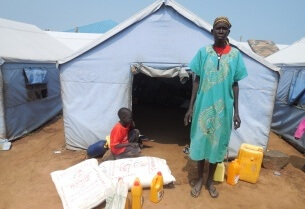Starting in December 2013, severe fighting between government and opposition forces caused families to flee their homes. Tens of thousands have been killed in the fighting, which focussed particularly on Upper Nile, Unity and Jonglei states.
With over 1.4 million people displaced within South Sudan, people have been left hungry and sick, as the capacity to support them has been exceeded. The Church was often the first and sometimes the only source of assistance, particularly in more remote areas, where the conflict was more prolonged. Relief organisation have worked to provide support, but have been hampered by lack of funds, as well as access problems, due both to the fighting and severe flooding during an unusually long rainy season. The UN estimates that by early 2015 2.5 million people are likely to be facing severe food insecurity, due to disrupted livelihoods and markets. An estimated 235,000 children are currently suffering from severe malnutrition.
Throughout this time, the Anglican Alliance has hosted conference calls between the Episcopal Church of South Sudan and Sudan (ECSS&S) Emergency Crisis Committee (ECC) and Anglican and Episcopal partners around the world. This has kept partners informed of the situation as it develops and has also helped them to post appeals to support the ECC as it responded to humanitarian needs. The Church response has been conducted in two phases. The first phase targeted relief to the areas most impacted by the initial displacement: Awerial, in Lakes state, Nimule, on the border with Uganda, and Lologo 2 camp outside Juba. In their final report, the ECC record provision of cooked food to 3000 displaced children in Awerial, and dry food packets to 40,032 people in Awerial, 10,129 people in Melijo camp in Magwe county in Nimule, 6,473 people in Lologo 2 camp in Juba, and 1,800 vulnerable families (12,600 people) in Renk.
The needs far exceeded the funds received by the ECSS&S’ relief and development arm, SUDRA, so they prepared a proposal to serve newly displaced populations with dry food in the Phase 2. This second phase also included activities on camp-based education, trauma healing & counselling, training in reconciliation processes and skills building for rehabilitation & resettlement. These activities are now ongoing, with trauma healing training conducted by the Education Commission and income generation training by the Mothers’ Union.
The needs are huge, as most people in South Sudan have been affected by the current crisis, having lost loved ones, been injured in the conflict, having to flee their homes in fear of their lives, or hosting those who have been displaced.
Please pray and please stand in solidarity, as the people of South Sudan mark the first anniversary since the outbreak of conflict last December.
Please support the vital work of the Emergency Crisis Committee of ECSS&S, alongside others working in South Sudan, as they use their grass roots network of churches to bring relief, comfort, healing and skills to those communities worst affected by the crisis, by visiting the links to these Anglican and ecumenical appeals:
Anglican Board of Mission – Australia
Anglican Overseas Aid – Australia
Christian Aid – UK
Episcopal Relief & Development – USA
Mothers’ Union – Mary Sumner House in UK
Primates World Relief and Development Fund – Canada
Please pray:
As Rev Joseph Elhag, General Manager of the Sudanese Development and Relief Agency (SUDRA) of the ECSS&S, prayed this week:
“Let the power of love overcome the love of power so that people in the world can live in peace”.
Please pray for the Church, as it responds to the need of the communities they live in. Church leaders are displaced, like their people, and are ministering in camps in South Sudan, but also in Sudan, Ethiopia, Kenya and Uganda. Pray for them, for their support and for healing of the trauma they too have suffered, so that they can help the communities to heal and renounce violence.
Please pray for the country, its leaders and its people on this the anniversary of the start of the conflict, that the leaders will listen to the cries of the people for peace and that the peace talks will succeed in creating lasting peace.
The House of Bishops of the Episcopal Church of South Sudan and Sudan have published a communiqué from their recent meeting in November, which calls yet again for the warring parties to work together for the sake of the people:
“We reaffirm our commitment to peace and reconciliation and the healing of the wounds of the past and present in our people’s hearts. The people of South Sudan had suffered beyond description for many years in the hands of governments in the old Sudan but now the people of South Sudan continue to suffer in the hands of their own political leaders – the government of South Sudan and the rebels. We want to inform the warring parties that our people are tired of war and they urgently need peace and development.
“To achieve peace the Episcopal Church of South Sudan and Sudan is embracing just peace for all, asking our political leaders to allow peace to come soon and accept one another as one people in one nation. We continue to urge our leaders to implement the agreements signed so far. May the Almighty God deliver us from the powers of darkness and continue to bless South Sudan and Sudan.”
The full text of the communique can be read here.
Efforts continue towards a peace agreement, under the auspices of the Inter-Government Authority on Development (IGAD); however talks have stalled over power sharing arrangements. More details about the talks and their progress, such as the cessation of hostilities agreement, can be found here.
Photos from IDP camps in Lologo 2 and Nimule. Photo credit: SUDRA

